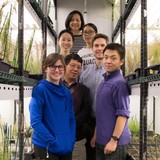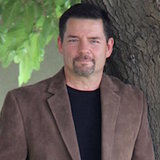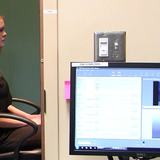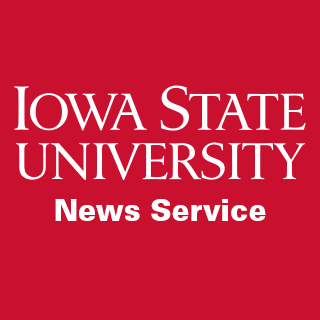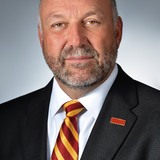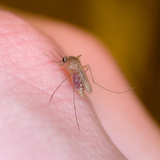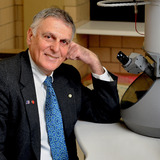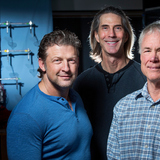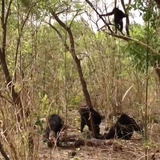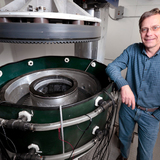News Archive
Friday, February 24 2017
-
Veteran space shuttle astronaut Kathryn Thornton will speak at ISU March 6
Former astronaut Kathryn Thornton who logged 975 hours in space travel — including 21 hours on space walks — will speak at Iowa State as part of the Women's Leadership Lecture series. She will present "Why We Explore Space" at 8 p.m. Monday, March 6, in the Memorial Union Sun Room. Her talk is free and open to the public.
-
Iowa State University researchers detail genetic mechanisms that govern growth and drought response in plants
New Iowa State University research outlines how the genetic pathways that govern growth and stress response in plants sometimes clash. The research could lead to better performing crop varieties.
-
Remuda Ranch director is March 1 keynote speaker for ISU Eating Disorder and Body Image Awareness Week
Buck Runyan, distinguished specialist in the treatment of eating disorders, will present "Eating Disorders Simplified" at 7 p.m. Wednesday, March 1, in the Memorial Union Sun Room. His presentation is the keynote address for Iowa State's Eating Disorder and Body Image Awareness Week, and is free and open to the public.
-
Helping parents understand BMI may lead to positive changes in childhood obesity
Schools are taking a proactive approach to get students to move more, but it takes a team effort. A new study, published in Childhood Obesity, found parents were more likely to change their child’s lifestyle when schools provided educational materials along with the results of their child’s body mass index screening.
-
Iowa State engineer addresses need for scientists, engineers to engage the public
Iowa State University is helping faculty and graduate students develop broader impacts activities to engage the public and benefit society. An Iowa State engineer will describe the university's efforts during a seminar at the annual meeting of the American Association for the Advancement of Science.
-
In the eye of the beholder: ISU researchers use eye-tracking technology to detect deception
Researchers in Iowa State University’s College of Business are using eye-tracking technology to better detect when people are lying. They’re specifically interested in cues that may signal deception during job interviews. Go inside the college’s neuroscience lab to see how the research could help businesses weed out dishonest employees.
-
Iowa State receives AAU grant to improve undergraduate education in science, technology, engineering and math
Iowa State is one of 12 universities to receive a grant from the Association of American Universities to improve undergraduate education in science, technology, engineering and math, or STEM disciplines. The $20,000 grant will support cross-disciplinary teams, create new networks and accelerate educational change, according to Jo Anne Powell-Coffman, professor and chair of the Department of Genetics, Development and Cell Biology and the project coordinator.
-
ISU report: Iowa public schools benefit from SAVE, but fund may not be enough for future needs
Money collected through a one-cent statewide sales tax has helped Iowa schools make significant progress in addressing overdue facility and equipment needs, according to an economic analysis by Iowa State University researchers. The study also found that school districts used the Secure an Advanced Vision for Education (SAVE) Fund to provide property tax relief. However, researchers project that the fund will not be enough to meet future needs.
-
President Leath: Every member of the Cyclone family is important, valued
In a letter to the university community, President Steven Leath shares his thoughts on the executive order and underscores his commitment to a safe, welcoming and inclusive environment for all.
-
Change agent: Michael Young
Michael Young wants to help students excel in science, technology, engineering and math by bridging the cultural divide that exists in many public schools. The fact that it exists is not intentional, but Young says we need to acknowledge it in order to move forward. Young’s motivation stems from his own childhood experiences.
-
Iowa State University to take part in center of excellence focused on vector-borne diseases such as Zika, West Nile
Iowa State University is one of several institutions taking part in a new national center studying diseases spread through the bites of infected insects. The Upper Midwestern Center of Excellence in Vector Borne Diseases is funded by a $10 million grant from the Centers for Disease Control and Prevention.
-
Nobel Laureate Dan Shechtman to link entrepreneurship, world peace in public lecture
Nobel Laureate Dan Shechtman of Iowa State, the Ames Laboratory and Israel's Technion will give a public lecture linking technological entrepreneurship to world peace and prosperity. The lecture will be at 5:30 p.m., Monday, Feb. 6, in the Great Hall of the Memorial Union. The event is free and open to the public.
-
Iowa State University scientists design electricity generator that mimics trees
ISU researchers have built a prototype biomimetic tree that generates electricity when wind blows through its artificial leaves. The researchers think such technology may help people charge household appliances without the need for large wind turbines.
-
Chimps’ behavior following death disturbing to ISU anthropologist
Shocking is one word Jill Pruetz uses to describe the behavior she witnessed after a chimp was killed at her research site in Fongoli, Senegal. The fact that chimps would kill a member of their own community is extremely rare – most aggression is between communities – but the abuse that followed was completely unexpected.
-
Iowa State scientist receives grants to improve glacier-flow models, sea-level predictions
Iowa State's Neal Iverson, who has studied glaciers in Iceland and Norway, is working with an international team on two projects that aim to build more realistic computer models of glacier flow. The researchers hope to understand how glaciers will speed up over the next century as the climate warms. They say that could help them predict how much glaciers will contribute to the rise of sea levels.
-
Video game ratings work, if you use them
Nearly every video game sold or downloaded comes with a rating that provides age-appropriate guidelines based on the game’s content. Critics have questioned the effectiveness of ratings, but new research from Iowa State University finds children spend less time playing violent video games when their parents use the rating system to guide purchases and set rules for video game play.

